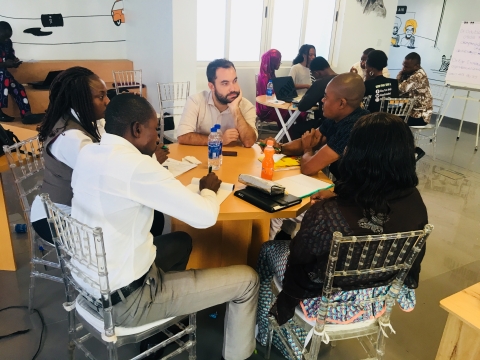
During the six-month program, journalists worked with trainers such as ICFJ Knight Fellow Jacopo Ottaviani.
A cadre of newly trained journalists from across Nigeria have reached millions of readers and listeners with stories on climate and migration issues affecting their communities, as part of a program to bolster coverage of these critical topics in a part of the world deeply influenced by them.
The 40 journalists who participated in the International Center for Journalists (ICFJ) and United Nations Foundation program produced more than 50 stories on topics such as migration linked to conflict, flooding and desertification, and the resulting impact on health and economic security.
They worked with environmental and population experts, as well as top media trainers from Africa and beyond. The training, both virtual and in-person courses, focused on better understanding climate issues, learning data-driven tools and strengthening multimedia storytelling techniques.
As part of a story competition for program participants, a panel of judges recognized three journalists for their outstanding coverage:
- First Place: Ochiaka Ugwu of People’s Daily won first place for his story “The People Whose Soil is Turning to Trash.” Ugwu’s impressive story incorporated the voices of struggling farmers to examine the harsh impact of desertification on communities. Due to the land, residents are forced to leave because the soil can no longer sustain the farming practices.
- Second place: Babatunde Okunlola, from Royal FM, won second place with an in-depth radio report titled, “Illorin: The Place Called Away.” The radio broadcast focused on massive dump sites, a side effect of population growth, and the resulting damage to the general environment and public health.
- Third place: Third place winner, Kelechukwu Iruoma, used photos, charts and videos for his multimedia story on the Benue region. His story, published by Ripples Nigeria, detailed how the area could experience food shortages in the future as climate change in the form of floods and limited rainfall hit major food production.
- Honorable mention: Special mention goes to Vanessa Offiong for her story, “When Antenatal is a Luxury: The IDP Story,” which examined the high cost and low availability of care for pregnant women living in camps for internally displaced persons (IDPs).
The three winners received cash prizes of $1,000, $500 and $250.
The program encouraged Nigerian reporters to produce compelling stories on the UN Sustainable Development Goals 10 and 13, aiming to “reduce inequality within and among countries” and to “combat climate change and its impact” by 2030. Other participants produced stories on topics such as health care in camps for displaced people, conflicts between farmers and herdsmen and the relation to migration, land degradation as a result of illegal gold mining, increases in annual flooding and population movements that stem from oil spills.